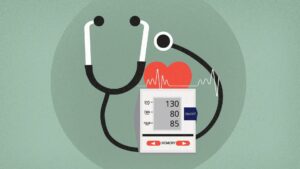You’ve probably heard that excess belly fat is not good for your health. But did you know that it can actually increase your risk of serious health problems? From cardiovascular disease to psychological issues, this blog post has everything you need to know about the risks of belly fat. So if you’re concerned about your belly fat, be sure to read this post!
Contents
Risks Of Belly Fat
Here are the major risks of belly fat explained comprehensively:
Cardiovascular Disease
 Belly fat is linked to an increased risk of heart disease, stroke, and other cardiovascular diseases. That’s because belly fat produces hormones that can cause inflammation in the body, raising your blood pressure and increasing your risk for a host of health problems, including heart attack and stroke.
Belly fat is linked to an increased risk of heart disease, stroke, and other cardiovascular diseases. That’s because belly fat produces hormones that can cause inflammation in the body, raising your blood pressure and increasing your risk for a host of health problems, including heart attack and stroke.
Studies have also shown that people with excess belly fat are more likely to develop high blood pressure, which can increase the risk of heart attack and stroke. One study found that people with the highest levels of belly fat had four times the risk of heart disease compared to those with the lowest levels. Another study found that people with higher levels of belly fat had a significantly greater risk of stroke than those with lower levels.
Some diseases that are associated with CVD are congestive heart failure, peripheral artery disease, and coronary artery disease. While all are serious and potentially life-threatening, they can be prevented or managed through lifestyle changes such as proper diet and exercise.
People with CVD may need to take certain medications, such as statins or blood thinners, to help manage their condition. CVD treatment usually involves a combination of lifestyle changes and medications.
Diabetes
Belly fat is associated with an increased risk of type 2 diabetes. That’s because excess abdominal fat can cause insulin resistance, which is a condition in which the body doesn’t respond properly to insulin. Insulin is a hormone that helps regulate blood sugar levels, and people with insulin resistance have elevated levels of both glucose and insulin in their blood.
Over time, elevated levels of glucose and insulin in the blood can lead to type 2 diabetes. Studies have shown that people with higher levels of belly fat are more likely to develop type 2 diabetes than those with lower levels. One study found that people with the highest levels of belly fat had up to six times the risk of developing type 2 diabetes compared to those with the lowest levels.
Some complications of long-term diabetes are blindness, nerve damage, kidney disease, and heart disease.
People with diabetes may need to take certain medications to help keep their blood sugar levels in check. They may also need to make changes to their diet and exercise routine to help keep their glucose levels within a healthy range.
Certain Cancers
 Excess abdominal fat is associated with an increased risk of certain types of cancer, including colorectal, breast, and endometrial cancer.
Excess abdominal fat is associated with an increased risk of certain types of cancer, including colorectal, breast, and endometrial cancer.
Studies have shown that people with higher levels of belly fat are more likely to develop colorectal cancer than those with lower levels. One study found that people with the highest levels of belly fat had up to four times the risk of developing colorectal cancer compared to those with the lowest levels.
Studies have also shown that people with high levels of belly fat are more likely to develop breast cancer and endometrial cancer than those with lower levels. One study found that women with the highest levels of belly fat had up to four times the risk of developing endometrial cancer compared to those with the lowest levels.
Preventing certain cancers and other health conditions linked to belly fat may involve lifestyle changes such as eating a healthy diet, getting regular exercise, and maintaining a healthy weight. For people who are at higher risk of these diseases, it’s important to talk with their healthcare provider about early detection and prevention strategies.
Certain medications may also be used to help reduce the risk of certain cancers. For example, women at higher risk for breast cancer may be prescribed certain hormone therapies to help reduce their risk. People at higher risk for colorectal cancer may also take certain medications or undergo early screenings to help detect the disease before it progresses.
It’s important to talk to your healthcare provider about the best approach for you. They can help you create an individualized plan that takes into account your personal risk factors and lifestyle goals.
Sleep Apnea
Sleep apnea is a serious sleep disorder in which a person’s breathing pauses and resumes multiple times during the night. It can be caused by excess abdominal fat, which can put pressure on the airway and make it difficult for a person to breathe.
Sleep apnea can lead to a number of health problems including fatigue, high blood pressure, increased risk of heart attack or stroke, and depression. People with sleep apnea may also experience loud snoring, daytime sleepiness, and restless nights.
Treatment for sleep apnea usually involves lifestyle changes such as losing weight if necessary, avoiding alcohol close to bedtime, quitting smoking, and sleeping on your side. CPAP machines may also be used to help keep the airway open during sleep. Surgery is sometimes an option for people with more severe cases of sleep apnea.
It’s important to talk to your doctor if you think you may have sleep apnea so that they can create a treatment plan that is right for you. Identifying and treating the condition early can help reduce your risk of developing serious health complications in the future.
High Blood Pressure
 High blood pressure, or hypertension, is a condition in which the force of the blood pushing against the walls of your arteries is too high. It’s one of the major risk factors for heart disease, stroke, and other health conditions.
High blood pressure, or hypertension, is a condition in which the force of the blood pushing against the walls of your arteries is too high. It’s one of the major risk factors for heart disease, stroke, and other health conditions.
Excess abdominal fat can raise your risk of developing high blood pressure. Studies have shown that people with higher levels of belly fat are more likely to have an elevated blood pressure than those with lower levels.
People who are overweight or obese are more likely to develop high blood pressure, so it’s important to maintain a healthy weight by eating a balanced diet and getting regular exercise. Limiting alcohol intake, quitting smoking, and managing stress can also help reduce the risk of hypertension.
If you think you may be at risk for high blood pressure, talk to your doctor about having your blood pressure checked regularly. If necessary, they can prescribe medications or lifestyle changes to help reduce your risk factors and keep your blood pressure in check.
Dementia
Dementia is a progressive disorder that affects memory, thinking, and behavior. It can lead to difficulty with activities of daily living, such as getting dressed and bathing, and it can also cause changes in mood or personality.
Research has shown that having excess abdominal fat increases your risk of developing dementia. Excess weight around your midsection can affect the brain’s ability to function properly, leading to a decline in cognitive abilities.
The best way to prevent dementia is to maintain a healthy lifestyle, including eating a balanced diet, exercising regularly, quitting smoking if you smoke, limiting alcohol consumption, managing stress levels, and maintaining a healthy weight. If you think you may be at risk for dementia, talk to your doctor so they can assess your individual situation and create a plan to help reduce your risk.
Gallbladder Disease
Gallbladder disease is a group of disorders that affect the gallbladder, a small organ located just below the liver. These disorders can lead to pain, discomfort, and other symptoms such as nausea, vomiting, and changes in stool consistency.
Excess abdominal fat increases your risk of developing gallbladder disease. Fat cells in the abdomen release hormones and chemicals that can cause inflammation in the gallbladder, leading to an increased risk for gallstones and other health problems.
Maintaining a healthy weight is key to reducing your risk of gallbladder disease. Eating nutritious foods and getting regular exercise can help you maintain a healthy weight, as well as reduce inflammation throughout your body. If you think you may be at risk, talk to your doctor so they can assess your individual situation and create a plan to help reduce your risk factors.
Non-Alcoholic Fatty Liver Disease
Non-alcoholic fatty liver disease (NAFLD) is a condition in which fat accumulates in the liver. This can lead to inflammation and scarring of the tissue, as well as an increased risk for cirrhosis and liver cancer.
Excess abdominal fat can increase your risk of developing NAFLD. Fat cells in the abdomen release hormones that can cause inflammation in the liver, leading to an increased risk for this condition.
Maintaining a healthy weight is key to reducing your risk of NAFLD. Eating nutritious foods, exercising regularly, limiting alcohol consumption, and managing stress levels can help you maintain a healthy weight and reduce inflammation throughout your body. If you think you may be at risk, talk to your doctor so they can assess your individual situation and create a plan to help reduce your risk factors.
Pancreatitis
Pancreatitis is an inflammation of the pancreas, a small organ located in the abdomen. It can lead to abdominal pain, nausea, and vomiting.
Excess abdominal fat increases your risk of developing pancreatitis. Fat cells in the abdomen release hormones and chemicals that can cause inflammation in the pancreas, leading to an increased risk for this condition.
The best way to prevent pancreatitis is to maintain a healthy lifestyle, including eating a balanced diet, exercising regularly, quitting smoking if you smoke, limiting alcohol consumption, managing stress levels, and maintaining a healthy weight. If you think you may be at risk for pancreatitis, talk to your doctor so they can assess your individual situation and create a plan to help reduce your risk.
Kidney Disease
 Excess abdominal fat can increase your risk of developing kidney disease. Fat cells in the abdomen release hormones and chemicals that can cause inflammation in the kidneys, leading to an increased risk for this condition.
Excess abdominal fat can increase your risk of developing kidney disease. Fat cells in the abdomen release hormones and chemicals that can cause inflammation in the kidneys, leading to an increased risk for this condition.
Studies have shown that maintaining a healthy weight is one of the best ways to reduce your risk of kidney disease. Eating nutritious foods, exercising regularly, limiting alcohol consumption, and managing stress levels can help you maintain a healthy weight and reduce inflammation throughout your body. If you think you may be at risk for kidney disease, talk to your doctor so they can assess your individual situation and create a plan to help reduce your risk factors.
The best way to prevent kidney disease is to maintain a healthy lifestyle, including eating a balanced diet, exercising regularly, quitting smoking if you smoke, limiting alcohol consumption, managing stress levels, and maintaining a healthy weight. If you think you may be at risk for kidney disease, talk to your doctor so they can assess your individual situation and create a plan to help reduce your risk factors.
Stroke
Excess abdominal fat can increase your risk of having a stroke. Fat cells in the abdomen release hormones and chemicals that can cause inflammation throughout the body, leading to an increased risk for this condition.
Maintaining a healthy weight is key to reducing your risk of stroke. Eating nutritious foods, exercising regularly, limiting alcohol consumption, and managing stress levels can help you maintain a healthy weight and reduce inflammation throughout your body. If you think you may be at risk for stroke, talk to your doctor so they can assess your individual situation and create a plan to help reduce your risk factors.
The best way to prevent stroke is by maintaining a healthy lifestyle, including eating a balanced diet, exercising regularly, quitting smoking if you smoke, limiting alcohol consumption, managing stress levels, and maintaining a healthy weight. If you think you may be at risk for stroke, talk to your doctor so they can assess your individual situation and create a plan to help reduce your risk factors.
High LDL And Low HDL Cholesterol
Excess abdominal fat can increase the risk of having high LDL cholesterol and low HDL cholesterol. Fat cells in the abdomen release hormones that can cause changes to levels of fats circulating through the bloodstream, leading to an increased risk for these conditions.
The best way to prevent high LDL and low HDL cholesterol is by maintaining a healthy lifestyle, including eating a balanced diet, exercising regularly, quitting smoking if you smoke, limiting alcohol consumption, managing stress levels, and maintaining a healthy weight. Eating foods that are low in saturated fat and rich in omega-3 fatty acids can help reduce your risk of developing these conditions. If you think you may be at risk for high LDL or low HDL cholesterol, talk to your doctor so they can assess your individual situation and create a plan to help reduce your risk factors.
Psychological Issues
Excess abdominal fat can put you at a higher risk for psychological issues, such as anxiety and depression. Fat cells in the abdomen release hormones and chemicals that can cause changes to neurotransmitters, leading to an increased risk of mental health issues.
Maintaining a healthy weight is one of the most effective ways to reduce your risk factors for psychological issues. Eating nutritious foods, exercising regularly, limiting alcohol consumption, and managing stress levels can help you maintain a healthy weight and reduce inflammation throughout your body. Additionally, engaging in activities such as yoga or meditation can help reduce stress levels and improve overall mental health. If you think you may be at risk for psychological issues, talk to your doctor so they can assess your individual situation and create a plan to help reduce your risk factors.
The best way to prevent psychological issues is by maintaining a healthy lifestyle, including eating a balanced diet, exercising regularly, quitting smoking if you smoke, limiting alcohol consumption, managing stress levels, and maintaining a healthy weight. Additionally, engaging in activities such as yoga or meditation can help reduce stress levels and improve overall mental health.
Conclusion
Excess abdominal fat can lead to an increased risk of many serious health conditions, including heart disease, diabetes, kidney disease, stroke, and high LDL and low HDL cholesterol. The best way to prevent these health issues is by maintaining a healthy lifestyle that includes eating nutritious foods, exercising regularly, quitting smoking if you smoke, limiting alcohol consumption, managing stress levels, and maintaining a healthy weight. If you think you may be at risk for any of these conditions, talk to your doctor so they can assess your individual situation and create a plan to help reduce your risk factors.
Consider contacting FitMantra for additional information on nutrition and fitness. You can also get in touch with their nutrition experts through our online nutrition counseling, who can guide you through the process and help you achieve your fitness goals. You can also lose weight with the help of our weight loss program. Download our Fitness app on Android to learn more about us.

Very interesting details you have mentioned, thanks
for posting.Money from blog